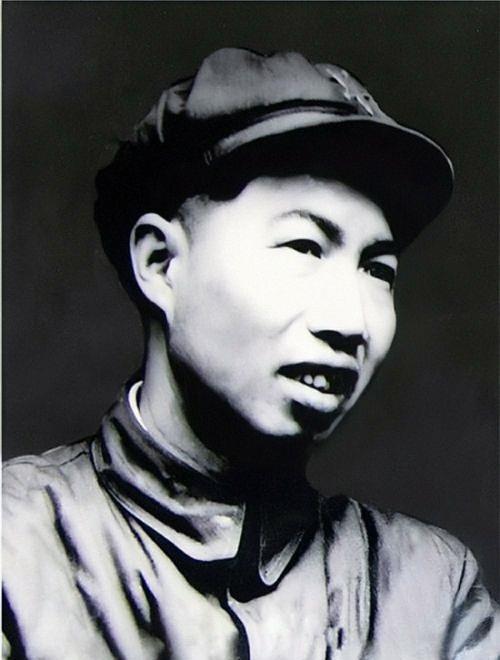In 1955, at the ceremony of awarding the title of meritorious service for the first time after the founding of the People's Republic of China, he fought 1365 battles in his lifetime, was seriously wounded 6 times, and had already become a military commander on the eve of the liberation of the country, and Xiao Feng, who had been an officer after the founding of the People's Republic of China and deputy commander of the armored large arms of the Beijing Military Region, fully met the criteria for awarding the title of founding major general or even a founding lieutenant general according to relevant qualifications and military merits, but finally was only awarded the rank of colonel.
Xiao Feng, whose ancestral home is Taihe, Jiangxi, officially joined the Red Army after joining the peasant uprising launched by our army in Gannan, Jiangxi, at the age of 11, and at the age of 14 he gloriously joined our party and became a little red devil.

Xiao Feng
Therefore, a few years later, when Taihe established the independent regiment, Xiao Feng was specially promoted to independent regimental commander by the military chief because of his excellent military and political command skills.
He made many meritorious achievements in several anti-encirclement and suppression battles to defend the revolutionary Soviet areas, and later became an officer of the Organization Department of the General Political Department of the Red Army and a political commissar of the Red First Main Force Army, and participated in the 25,000-mile Long March that changed the fate of our army and the Chinese revolution, and his revolutionary qualifications were very deep.
After the outbreak of the War of Resistance Against Japanese Aggression in 1937, Xiao Feng served as the political commissar of the cavalry regiment of the Eighth Route Army, was ordered to go to the North China Theater, led his troops to go deep behind the enemy lines in Jinchaji, and fought guerrilla warfare.
In 1939, when the Eighth Route Army went deep into Chen Zhuang in Lingshou, Hebei Province, and launched an ambush battle against Japan, Xiao Feng was ordered to personally lead his troops to fight a bloody battle for five days and five nights surrounded by 1,500 enemy troops, trying to ensure that the position was not lost, and commanded the heavy machine gunners to kill the commander of the Japanese "cattle knife" expert water source brigade.
Moreover, Xiao Feng also took the lead in carrying out tactics such as "sparrow warfare," "tunnel warfare," and "mine warfare" on the Hebei Plain, and repeatedly accomplished miraculous feats in the battles of magnetism, forest-wading, and hundred regiments.
During the Liberation War, Xiao Feng served as the commander of the Shandong Bohai Naval Sub-district and the deputy commander of Huaye, and rode across the battlefields of the Central Plains and Shandong. Following Su Yu to participate in the great victories in the battles of liberating Laiwu, Menglianggu, Anhui, Henan Yudong, Shatuji, Shandong Jinan, Xuzhou Huaihai, The Decisive Battle of Crossing the River, and Shanghai, he was able to attack and defend well, and also made special efforts to develop a "flying explosive pack", which played a huge role in the offensive operation, and was praised by Chairman Mao as one of the five major inventions in the Liberation War.
Originally, according to such seniority and military achievements, Xiao Feng was fully qualified to be rated as a founding lieutenant general after the founding of the people's republic, but unfortunately, after the Xiamen Campaign, Xiao Feng was ordered to arrive in Kinmen and serve as the commander-in-chief of the former enemy, and under the premise of not understanding the enemy's situation and not making full preparations, he hastily launched the Kinmen Campaign, and finally trapped on the isolated island due to the rising tide and the low tide, resulting in 9,000 people being deeply surrounded by more than 40,000 enemy troops, and almost the entire army was destroyed.
After the war, after the war, Xiao Feng was demoted to three consecutive levels and became the deputy division commander because of his defeat in command of the battle, causing heavy casualties to our army, which cast a thick layer of "haze" on his military career.
Battle of the Golden Gate
After the founding of New China, Xiao Feng was successively transferred to East China and Beijing, serving as the deputy commander of the armored arms and the principal of the tank school, completely losing the opportunity to lead the troops in the front line, and because of the negative impact of his defeat in the Battle of Kinmen and the commander-in-chief of the former enemy, he was finally awarded the rank of founding colonel when he was awarded the rank in 1955.
In the face of such treatment, Xiao Feng also expressed his frank acceptance without any complaints, until 1961, when the state considered that Xiao Feng had fought 1365 battles in his life, was seriously wounded 6 times, and made outstanding contributions to the Chinese revolution, national independence and self-determination, and the great cause of the liberation of the people of the whole country, and the superior chief specially promoted Xiao Feng to the founding major general.
But even so, Xiao Feng still maintained the revolutionary original intention of being an old Red Army, forged ahead for the creation of the armored tank engineering unit for the country and the modernization and unification and regularization of the new Chinese army, worked hard for 30 years, made great contributions, and made great achievements, until the beginning of February 1991, Xiao Feng died of illness in Beijing at the age of 75.